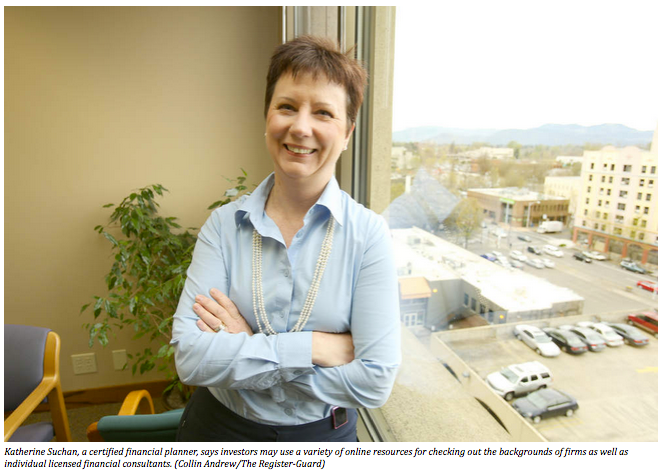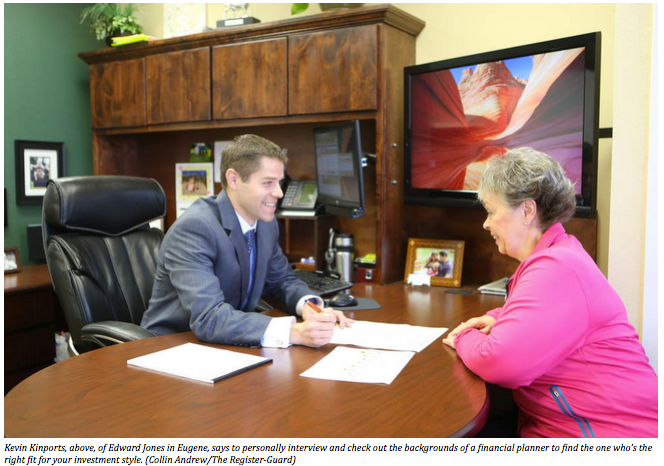This was one of three articles that was published in the Register-Guard’s annual special publication, Destination: Retirement, in March 2015.
Consider your needs and ask the right questions before committing to this important relationship.
By Vanessa Salvia
Kevin Kinports, a certified financial planner at Edward Jones in Eugene, says that selecting a financial planner is one of the most important decisions you’ll make — and one of the most important business relationships you’ll ever have.
“It is well worth it to take time on the front end to make sure you’re working with someone who is a good fit for you from the start,” he says.
Do your homework
Financial planning is a highly regulated industry, so there are many options for investigating planners online before meeting with them.
Katherine “Kath” Suchan, a certified financial planner at Journey Tree Financial Planning & Investments in Eugene, recommends starting with the U.S. Securities and Exchange Commission (SEC) website or the Financial Industry Regulatory Authority (FINRA) Broker Check.
“You can pull up reports on firms, you can pull up reports on any licensed individual, you can see how many companies they’ve worked for, you can see what licenses they have, do they have a clean background, are they following the rules, do they have a history that’s understandable,” she says.
Many factors to consider
Suchan recommends asking yourself what “hot spot” is causing you to want to find a financial planner. If it’s planning for the care of a special needs child, for instance, or a life change such as divorce, retirement or inheritance, you may want to seek out someone with experience with your particular issue.
Kinports adds that while “certified financial planner” is not the only designation someone can earn, CFP is the most significant credential that can be earned by a financial planner. “A CFP will have a further discussion of risk and goals and what they’re trying to accomplish and what’s important,” he says. “Someone who is looking to maximize opportunity and maximize return may be a little more risky.”
Suchan concurs. “To me,” she says, “a financial planner looks at all aspects of a client’s life, not just the investments, not just the insurance, not just the cash flow.”
Suchan, who began in the industry 30 years ago, has been in Eugene for 20 years and with Journey Tree 18 months. She says she was fortunate to work with a variety of large firms, and has a diverse background. “It’s not bad to move around,” she says, “it just depends on what your ‘hot spots’ are and if you have some unusual circumstances. Sometimes people don’t get that breadth of experience by being with the same firm for 50 years.”
Kinports and Suchan provided a list of other important questions to ask a potential financial adviser:
How will you communicate with me? You want to understand if you will be getting notices quarterly or annually, or by mail, email or phone call. Suchan says she once had a client who expected to receive notices every time a transaction was made, and that’s not the way her firm operated.
What type of services do you provide? “Some people just sell investments,” Kinports says. “Some offer investments and insurance, and some offer advice as well, so understand the scope of what the advisers can offer.”
How are you paid? Advisers can be paid several different ways, such as fees based on asset level, commissions, salary, hourly or some combination. “Clients need to understand how they are paying for the advice and services that they’re getting,” Kinports says. “It’s a very fair question to ask, and an important one. There’s not a blanket way that’s perfect for every client.”
Do you have a minimum asset level? Some firms may not work with clients unless they have a minimum amount of assets.
Do you follow the fiduciary standard? “The fiduciary standard in our industry is that a financial planner has to act in the client’s best interest at all times,” Suchan says.
Holding to the fiduciary standard is part of the CFP’s code of ethics, but people who are not CFPs are not bound to follow the code. “They can do what’s good for the client, but it doesn’t have to be best for the client,” she explains. “Ask, ‘Do you follow the fiduciary standard?’ and they should say, ‘Yes.’ If they don’t, it’s a ‘Why not?’”
Writer Vanessa Salvia can be contacted at sp.feedback@registerguard.com.


No comments yet.